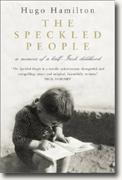The Speckled People
Hugo Hamilton
book reviews:
· general fiction
· chick lit/romance
· sci-fi/fantasy
· graphic novels
· nonfiction
· audio books
· author interviews
· children's books @
curledupkids.com
· DVD reviews @
curledupdvd.com
newsletter
win books
buy online
links
home
for authors
& publishers
for reviewers

 |
The Speckled People: A Memoir of a Half-Irish Childhood Hugo Hamilton Fourth Estate Hardcover 304 pages April 2003 |
|
With no less a person than Roddy Doyle extolling the virtues of this book, one hesitates to decry it. But this reviewer found The Speckled People problematic.
"We had hanging chocolate angels and lots of other things that had come in a big parcel from Germany. I knew that other children had Santa Claus and they knew what he was going to bring them. Sometimes people in the street would ask us what Santa was going to bring and we didn't know...one of the neighbors once brought us to see Santa in one of the shops, but I could see his brown fingers from smoking."The child in question is confused - as this reviewer was - because his mother was a refugee from Germany who thought speaking English was a good, desirable thing. But his father seized on a fierce Irish nationalism that led him to forbid the speaking of English in the home, and he never talked about his own father who died fighting for the British in World War I. His mother is scarred by the perfidies of her own people, struggling to live in a country that can't accept her German fancies and foibles. She is a moralist who has seen immorality up close and can't equivocate, come to live in a land where fantasy is a fact and there are no hard answers, not even "yes" and "no." She concludes, "It's not like Germany where a question is just a question. In Ireland people get offended by questions, because it's a way of saying what you're thinking. The only way to ask Mr McNally something politely was to offer him a cup of tea." The child is taunted with the name "Eichmann" and ultimately sentenced to "die" by his playmates in a mock tribunal. He saves himself by being, and feeling, as Irish as he can. "Jaysus, what the Jaysus, I kept saying." There is an endless string of characters, German and Irish, who march through the book, relatives with funny German names and funny Irish names. One of the more enigmatic of the book's people is the child's father who keeps bees - "he was dressed for going to the moon with a cage around his head" - and tries to invent things. A talented crafter, he has ideas like rewriting all the street signs in Gaelic or making little painted wagons. His convictions inevitably clash with those of his wife, who despises the Nazis, when in his zeal he gets to a point where he "wanted Jewish people in Ireland to speak Irish and do Irish dancing like everyone else." Yet the child has been told by his mother that "it was usually people who had something to hide who called other people Nazis." So his mother is a German, but not a Nazi, while his father isn't a Nazi, but he is oppressive in his insistence that English is a "killer language." His father says the British started the first World War by trying to stop the Germans from having their own empire. His mother says that "the Germans hardly behaved any better than the British and that instead of having an empire and keeping slaves, the Nazis made slaves of their own people." Finally the child begins to rebel against both parents, as children do. He's been tormented by being forbidden to speak a language that is common among his peers, and by the disgrace of his German-ness which he doesn't know how to be ashamed of since he loves his mother and her side of the family. Yet he has somehow become privy to secrets about his mother that no child could or should have to handle. He will live to know that his father was killed by his bees. He gets so mad he tries to drown a dog, and he finds a kind of redemption when he sees that "the dog with no name was coming down to bark at the sea as if nothing was wrong and he never drowned." The book ends with the understanding that the child will be alright, that he has found some inner strength that will pull him on. He and his mother are free.
|
|
|
|
 Click here to learn more about this month's sponsor! |
|
| fiction · sf/f · comic books · nonfiction · audio newsletter · free book contest · buy books online review index · links · · authors & publishers reviewers |
|
| site by ELBO Computing Resources, Inc. | |
 There's certainly nothing wrong with Hugo Hamilton's ability to dish out a tasty phrase. In speaking of his confusions over Christmas, being the "speckled" child of a German mother and an Irish father, the narrator tell us,
There's certainly nothing wrong with Hugo Hamilton's ability to dish out a tasty phrase. In speaking of his confusions over Christmas, being the "speckled" child of a German mother and an Irish father, the narrator tell us,